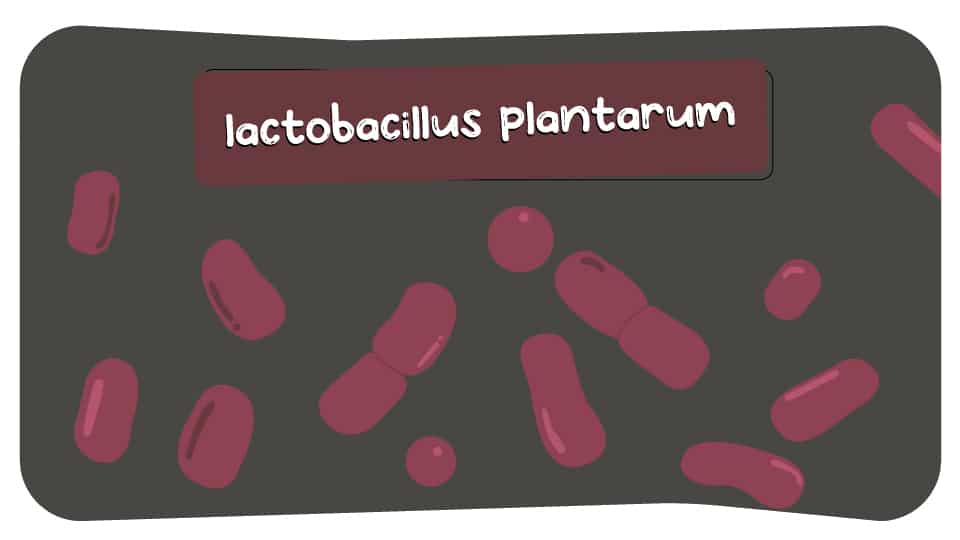5 Lactobacillus Plantarum Health Benefits: Digestive, Psychological And Skin

Lactobacillus Plantarum is a type of probiotic bacteria that belongs to the Lactiplantibacillus genus and has a rod-shaped, gram-positive structure. I will evaluate it's various benefits for digestive, psychological, and skin health and cover some sub-strain variants.
This beneficial microorganism is commonly found in fermented foods because of it's starter culture benfits. In humans it can be found in the gastrointestinal tract and also the mouth via saliva.
Here are 5 benefits of Lactobacillus Plantarum on human health.
1. Alleviates IBS Symptoms
IBS symptoms refer to a range of gastrointestinal issues, such as abdominal pain, bloating, diarrhea, and constipation, often accompanied by changes in bowel habits.
A clinical trial in the World Journal of Gastroenterology and authored by Philippe Ducrotté, evaluated the effects of Lactobacillus Plantarum 299v (DSM 9843) on Irritable Bowel Syndrome (IBS) symptoms.
The study's results showed that 78.1% of the group taking L. Plantarum 299v reported good or excellent results for their IBS symptoms compared to only 8.1% of the placebo group. The study's large dataset indicates conclusive results regarding L. Plantarum benefits for IBS symptoms like pain and bloating.
2. Improves Gut Permeability
Intestinal permeability, commonly known as "leaky gut," is a condition where the intestinal lining becomes more permeable than normal, allowing harmful substances like toxins and undigested food particles to pass through and enter the bloodstream.
A 2021 review by Mario Fidanza in Frontiers in Microbiology titled "Lactiplantibacillus plantarum–Nomad and Ideal Probiotic" discovered that L. Plantarum demonstrated the ability to effectively reduce gut permeability by suppressing the production of inflammatory cytokines, thus exerting an anti-inflammatory effect that was beneficial for individuals with Irritable Bowel Disease.
3. Alleviates Stress and Anxiety
Stress and anxiety are linked psychological experiences, with stress arising from external pressures and demands, and anxiety being the emotional and physical response to perceived threats or uncertainties. Prolonged or intense stress can lead to anxiety, characterized by excessive worry and physical symptoms, creating a cyclical relationship between the two.
A 2019 Randomized Controlled Trial, authored by Lee-Ching Lew looked at the effects of Lactobacillus plantarum P8 in stressed adults and the results showed that the L. Plantarum probiotic bacteria was feasible for the the alleviation of selected stress, anxiety compared to a placebo. The stress scores were reduced by an average of 2.94 points (ranging from 0.08 to 5.73), anxiety scores were reduced by an average of 2.82 points (ranging from 0.35 to 5.30). These measurements were based on the DASS-42 questionnaire.
4. Improves Major Depressive Disorder Cognition
Major Depressive Disorder cognition refers to the impact of depression on cognitive processes, such as thinking, memory, attention, and decision-making, which can often be impaired or altered in individuals experiencing the disorder.
A 2019 clinical trial authored by Dr L. Rudzki MD, PhD in Psychoneuroendocrinology tested the effects of Lactobacillus Plantarum 299v in the Augmentation of SSRI treatment for MDD and found it improved cognitive performance by decreasing kynurenine concentration through the gut-brain axis.
The trial involved 30 participants who took L. Plantarum with an SSRI for eight weeks, while another 30 participants took the same SSRI with a placebo probiotic with a total of 60 participants finishing the study out of an original 79.
5. Improves Eczema In Children
Atopic dermatitis, also known as eczema, in children refers to a chronic inflammatory skin condition characterized by red, itchy, and dry patches that commonly appear on the face, scalp, elbows, or knees, often accompanied by periods of remission and flare-ups.
A 2012 clinical trial authored by Youngshin Han, evaluated the results of the probiotic supplement Lactobacillus plantarum CJLP133 for Atopic Dermatitis (Eczema) in children aged 12 months to 13 years old and it showed beneficial effects in pediatric atopic dermatitis compared to a placebo group.
The participants were divided into two groups, with one group receiving a placebo, and the other group taking 5 Billion CFU of L. Plantarum CJLP133 strain twice per day for 12 weeks. The researchers evaluated Atopic Dermatitis scores, eosinophil counts, serum total IgE, and cytokines to determine if the L. Plantarum strain had any therapeutic effect.
What Is Lactobacillus Plantarum DR7?
Lactobacillus plantarum and Lactobacillus plantarum DR7 are two different strains of the same species, with each strain having unique characteristics and health benefits.
L. Plantarum DR7 specifically is a sub-strain or variant of Lactobacillus plantarum that modulate gut health, immunity and Bowel Movement. You can take the DR7 strain in a probiotic supplement called Floradapt that contains this strain at 1-billion CFU.
What Is Lactobacillus Plantarum 299v?
Lactobacillus Plantarum 299v is another lactic acid sub-strain of Lactobacillus Plantarum that is safe for human consumption and can be found in foods like sauerkraut, olives and capers.
Lactobacillus plantarum 299v (DSM 9843) can diminish IBS and Clostridium difficile infection symptoms according to paper authored by K Kaźmierczak-Siedlecka. You can obtain the 299v strain from a probiotic supplement called, Jarrow Formulas Ideal Bowel Support.
What is Lactobacillus Plantarum PS128?
Lactobacillus plantarum PS128 is another bacterium sub-strain known a psychobiotic that can help have positive effects in children with ASD without major side effects according to a 2021 study authored by MM Mensi. The PS128 strain can be acquired from a probiotic supplement called Nuva128.
Does Lactobacillus Plantarum Have Side Effects?
Lactobacillus Plantarum can cause minor side effects like bloating and diarrhea that usually subside after several weeks of use. It is however generally regarded as safe (GRAS) and has a Qualified Presumption of Safety (QPS) status which means that Lactobacillus Plantarum is safe to take in humans provided you are not immuno-compromised and don't have any bowel disorders.
Dr. Sara Mesilhy has a Master’s degree in Gastroenterology and holds a membership with the Royal College of Physicians of the United Kingdom. She completed her Bachelor of Medicine, Bachelor of Surgery (MBBS) at Cairo University and is currently part of the ProbioticReviewGirl medical team.